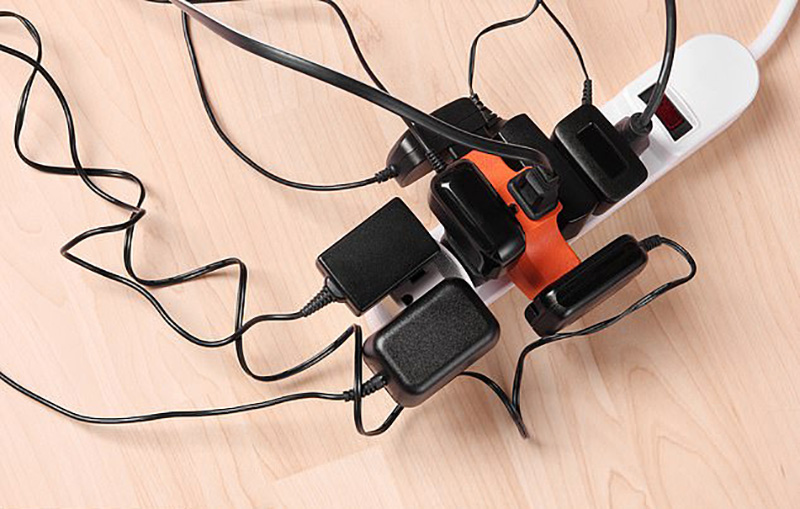[vc_row][vc_column][vc_column_text]
7 Electrical Hazards Around the Home

Electricity causes around 50,000 residential fires and kills or injures thousands every year in the U.S. Thankfully, most electrical hazards around the home are easy to avoid by using common sense and ensuring that outdated electrical systems are updated to the latest electrical code requirements.
Here are a few of the top home electrical hazards and tips on what you can do to protect your family and property.
1. Overloaded Outlets
Each outlet in your home is rated to supply a certain amount of power. Adding power strips to increase the capacity of outlets can lead to overloading and tripped circuits. If you’re unsure how much power an outlet can handle, ask your Hickey Plumbing, Air & Electrical technician. Installing additional outlets to handle additional demand is always the safest option.
2. Extension Cord Misuse
When it comes to extension cord use around the home the most important thing to remember is that they are meant for temporary use. When using extension cords follow these rules:
- Don’t chain extension cords together
- Regularly inspect cords for damage and replace cords if they are frayed or have loose plugs
- Never use extension cords as a substitute for permanently installed wiring
- Do not use extension cords where they can be a tripping hazard
- Keep extension cords out of standing water
3. Electrical Outlets or Appliances Near Water
In many older homes it’s not uncommon to find outlets in kitchens, bathrooms and outdoors without ground fault circuit interrupters (GFCI). This increases the risk of accidental electrocution.
Have Hickey Plumbing, Air & Electrical install GFCI outlets where they are required by the electrical code. GFCI outlets with “test” and “reset” buttons should be tested regularly to ensure they working.
4. Outdated or Faulty Wiring
The telltale signs of electrical problems to look for include dim and flickering lights, sizzling and buzzing sounds from your electrical system, and circuit breakers that trip repeatedly. Contact Hickey Plumbing, Air & Electrical immediately if you notice any of these warning signs.
5. Overloaded Electrical Circuits
If resetting tripped circuit breakers in your home is a common occurrence, it’s a sign that the circuit or wiring are defective, or that the circuit is not rated to handle the required power load. If a circuit has tripped, don’t take chances. Have Hickey Plumbing, Air & Electrical inspect the circuit to determine the cause.
6. Unprotected Outlets
The National Fire Protection Association reports that injuries involving electrical outlets sent an estimated 5,500 people to hospital emergency departments in 2015.
If there are young children in the home, install tamper resistant receptacles (TRR). TRRs are designed to prevent electrical shock by deactivating the outlet when anything other than an electrical plug is inserted.
7. Inoperable Smoke Alarms and Carbon Monoxide Alarms
Working smoke and carbon monoxide alarms can mean the difference between life and death. Test the alarms regularly and replace the batteries annually. Detectors have an expiration date printed on the case. Be sure to replace the unit before it has expired.[/vc_column_text][/vc_column][/vc_row]
